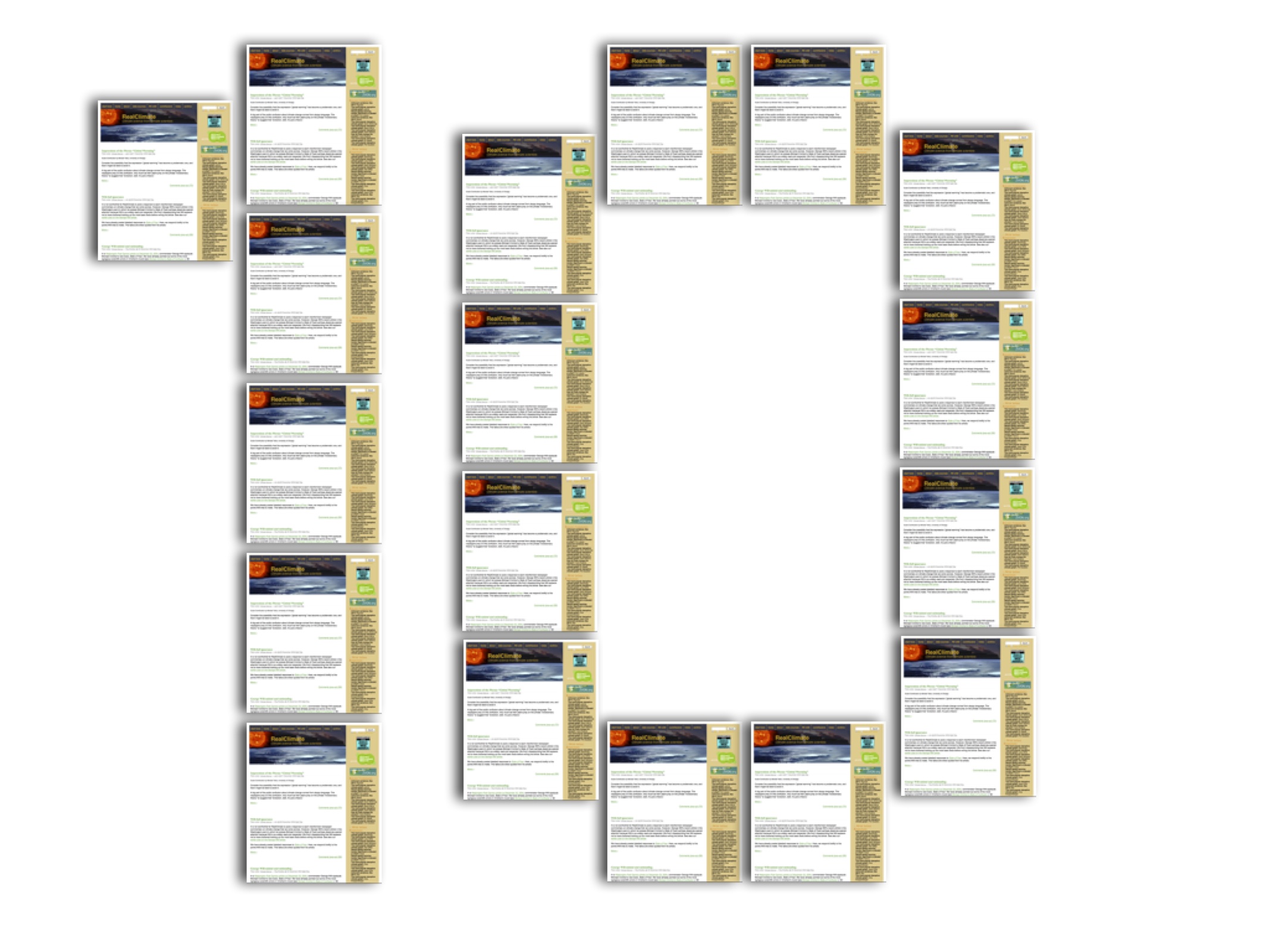This month’s open thread.
The return of the iris effect?
Guest commentary from Andy Dessler (TAMU)
When a new scientific hypothesis is published, two questions always occur to me:
- Did the authors convincingly show the hypothesis was correct?
- If not, is the hypothesis actually correct?
The answers to these two questions may not be the same. A good example is Wegener’s theory of continental drift — his idea was fundamentally correct, but he lacked the data and physical mechanisms to convince the rest of scientific community. It would take several decades before enough data were gathered that the scientific community wholeheartedly endorsed plate tectonics.
 In 2001, Prof. Richard Lindzen and colleagues published his “iris hypothesis” (Lindzen et al., 2001). The hypothesis has two parts: First, in a warmer climate, enhanced precipitation efficiency will lead to less cloud being detrained into the troposphere from convection. Second, with less cloud cover, more infrared radiation can escape to space, thereby creating a strong climate-stabilizing negative cloud feedback that prevents significant warming from increasing greenhouse gases.
In 2001, Prof. Richard Lindzen and colleagues published his “iris hypothesis” (Lindzen et al., 2001). The hypothesis has two parts: First, in a warmer climate, enhanced precipitation efficiency will lead to less cloud being detrained into the troposphere from convection. Second, with less cloud cover, more infrared radiation can escape to space, thereby creating a strong climate-stabilizing negative cloud feedback that prevents significant warming from increasing greenhouse gases.
Within a few years, a number of analyses made clear that the evidence provided by Lindzen et al. had problems [e.g., Hartmann and Michelsen, 2002; Lin et al., 2002; Lin et al., 2004; Su et al., 2008]. Lindzen and colleagues responded to these critiques, but few were convinced by their arguments. By 2006, when I submitted an analysis of tropospheric water vapor that investigated whether there was an iris in that, one of the reviewers pointedly questioned why anyone was still working on this issue. I subsequently withdrew the paper.
Nevertheless, just because Lindzen et al. did not convincingly demonstrate their case does not mean the iris hypothesis is wrong. With that idea in mind, a new paper by Mauritsen and Stevens (2015) revisits the iris hypothesis. The most important part of their work was to simulate the iris in a climate model by artificially tweaking the model’s convective parameterization. They do this by increasing the rate of conversion of cloud water to rain as the climate warms, thereby reducing the amount of detraining condensate in a warmer climate. In effect, this imposes a tweak that mimics the iris effect – it is not a demonstration that the iris effect emerges from any physical mechanisms.
What they find is that, even though cloud cover is reduced as the climate warms, it does not generate a strong negative cloud feedback. While reducing cloud cover does indeed let more infrared energy out, it also lets more sunlight in. These two effects, while independently large, act in opposite directions. The net effect is the small residual of their difference. For runs with the strongest “iris”, the model’s climate sensitivity is reduced from 2.8°C for doubled carbon dioxide to 2.2°C — still well within the IPCC’s canonical range.
It’s also worth pointing out what this study doesn’t prove. It doesn’t validate Lindzen et al.’s original hypothesis — in fact, it does the opposite – even with an iris effect, the sensitivity does not become negligible. Additionally, there is little evidence that the rate of conversion of cloud water to rain actually changes with temperature, although Mauritsen and Stevens show that incorporating the iris into the model does improve the model’s simulations of some aspects of the climate system (even though it doesn’t change climate sensitivity much).
I view this as a what-if calculation of the impact of such a process. Future research may validate this, or it may not. This kind of calculation is one of the reasons why we like using models, of course.
Another argument against the iris comes from my work looking at the cloud feedback in response to short-term climate variability. If the iris provided a strong negative feedback, then we would expect to see it in response to short-term climate fluctuations. Analysis of observations doesn’t show anything like that (Dessler, 2013).
Overall, I think the debate over the iris hypothesis is a testament to the efforts the scientific community goes through to evaluate challenges to theories and find ways to improve our understanding of the climate (for instance, see Bill Ruddiman’s post from last week). This is one of the most important reasons I have such high confidence in the scientific process for figuring out how the universe works.
References
- R.S. Lindzen, M. Chou, and A.Y. Hou, "Does the Earth Have an Adaptive Infrared Iris?", Bulletin of the American Meteorological Society, vol. 82, pp. 417-432, 2001. http://dx.doi.org/10.1175/1520-0477(2001)082<0417:DTEHAA>2.3.CO;2
- D.L. Hartmann, and M.L. Michelsen, "No Evidence for Iris", Bulletin of the American Meteorological Society, vol. 83, pp. 249-254, 2002. http://dx.doi.org/10.1175/1520-0477(2002)083<0249:NEFI>2.3.CO;2
- B. Lin, B.A. Wielicki, L.H. Chambers, Y. Hu, and K. Xu, "The Iris Hypothesis: A Negative or Positive Cloud Feedback?", Journal of Climate, vol. 15, pp. 3-7, 2002. http://dx.doi.org/10.1175/1520-0442(2002)015<0003:TIHANO>2.0.CO;2
- B. Lin, T. Wong, B.A. Wielicki, and Y. Hu, "Examination of the Decadal Tropical MeanERBSNonscanner Radiation Data for the Iris Hypothesis", Journal of Climate, vol. 17, pp. 1239-1246, 2004. http://dx.doi.org/10.1175/1520-0442(2004)017<1239:EOTDTM>2.0.CO;2
- H. Su, J.H. Jiang, Y. Gu, J.D. Neelin, B.H. Kahn, D. Feldman, Y.L. Yung, J.W. Waters, N.J. Livesey, M.L. Santee, and W.G. Read, "Variations of tropical upper tropospheric clouds with sea surface temperature and implications for radiative effects", Journal of Geophysical Research: Atmospheres, vol. 113, 2008. http://dx.doi.org/10.1029/2007JD009624
- T. Mauritsen, and B. Stevens, "Missing iris effect as a possible cause of muted hydrological change and high climate sensitivity in models", Nature Geoscience, vol. 8, pp. 346-351, 2015. http://dx.doi.org/10.1038/ngeo2414
- A.E. Dessler, "Observations of Climate Feedbacks over 2000–10 and Comparisons to Climate Models*", Journal of Climate, vol. 26, pp. 333-342, 2013. http://dx.doi.org/10.1175/jcli-d-11-00640.1
Unforced Variations: April 2015
Unforced variations: March 2015
The mystery of the offset chronologies: Tree rings and the volcanic record of the 1st millennium
Guest commentary by Jonny McAneney
Volcanism can have an important impact on climate. When a large volcano erupts it can inject vast amounts of dust and sulphur compounds into the stratosphere, where they alter the radiation balance. While the suspended dust can temporarily block sunlight, the dominant effect in volcanic forcing is the sulphur, which combines with water to form sulphuric acid droplets. These stratospheric aerosols dramatically change the reflectivity, and absorption profile of the upper atmosphere, causing the stratosphere to heat, and the surface to cool; resulting in climatic changes on hemispheric and global scales.
Interrogating tree rings and ice cores
Annually-resolved ice core and tree-ring chronologies provide opportunities for understanding past volcanic forcing and the consequent climatic effects and impacts on human populations. It is common knowledge that you can tell the age of a tree by counting its rings, but it is also interesting to note that the size and physiology of each ring provides information on growing conditions when the ring formed. By constructing long tree ring chronologies, using suitable species of trees, it is possible to reconstruct a precisely-dated annual record of climatic conditions.
Ice cores can provide a similar annual record of the chemical and isotopic composition of the atmosphere, in particular volcanic markers such as layers of volcanic acid and tephra. However, ice cores can suffer from ambiguous layers that introduce errors into the dating of these layers of volcanic acid. To short-circuit this, attempts have been made to identify know historical eruptions within the ice records, such as Öraefajökull (1362) and Vesuvius (AD 79). This can become difficult since the ice chronologies can only be checked by finding and definitively identifying tephra (volcanic glass shards) that can be attributed to these key eruptions; sulphate peaks in the ice are not volcano specific.
Thus, it is fundamentally important to have chronological agreement between historical, tree-ring and ice core chronologies: The ice cores record the magnitude and frequency of volcanic eruptions, with the trees recording the climatic response, and historical records evidencing human responses to these events.
But they don’t quite line up…
[Read more…] about The mystery of the offset chronologies: Tree rings and the volcanic record of the 1st millennium
Unforced Variations: Feb 2015
Unforced Variations: Jan 2015
AGU 2014
Once more unto the breach!
Fall AGU this year will be (as last year)
…the largest Earth Science conference on the planet, and is where you will get previews of new science results, get a sense of what other experts think about current topics, and indulge in the more social side of being a scientist.
Ten Years of RealClimate: Where now?
 The landscape for science blogging, the public discourse on climate and our own roles in the scientific community have all changed radically over the last 10 years. Blogging is no longer something that stands apart from professional communications, the mainstream media or new online start-ups. The diversity of voices online has also increased widely: scientists blogging and interacting directly with the public via Twitter and Facebook are much more prevalent than in 2004. The conversations have also changed, and (for the most part) have become more nuanced. And a bunch of early career researchers with enthusiasm, time to spare and things to say, have morphed into institute directors and administrators with lots of new pressures. Obviously, blogging frequency has decreased in the last year or so in response to these pressures and this raises the question: where does RealClimate go now?
The landscape for science blogging, the public discourse on climate and our own roles in the scientific community have all changed radically over the last 10 years. Blogging is no longer something that stands apart from professional communications, the mainstream media or new online start-ups. The diversity of voices online has also increased widely: scientists blogging and interacting directly with the public via Twitter and Facebook are much more prevalent than in 2004. The conversations have also changed, and (for the most part) have become more nuanced. And a bunch of early career researchers with enthusiasm, time to spare and things to say, have morphed into institute directors and administrators with lots of new pressures. Obviously, blogging frequency has decreased in the last year or so in response to these pressures and this raises the question: where does RealClimate go now?
Ten Years of RealClimate
 In the spring of 2004, when we (individually) first started talking to people about starting a blog on climate science, almost everyone thought it was a great idea, but very few thought it was something they should get involved in. Today, scientists communicating on social media is far more commonplace. On the occasion of our 10 year anniversary today it is worth reflecting on the impact of those changes, what we’ve learned and where we go next.
In the spring of 2004, when we (individually) first started talking to people about starting a blog on climate science, almost everyone thought it was a great idea, but very few thought it was something they should get involved in. Today, scientists communicating on social media is far more commonplace. On the occasion of our 10 year anniversary today it is worth reflecting on the impact of those changes, what we’ve learned and where we go next.